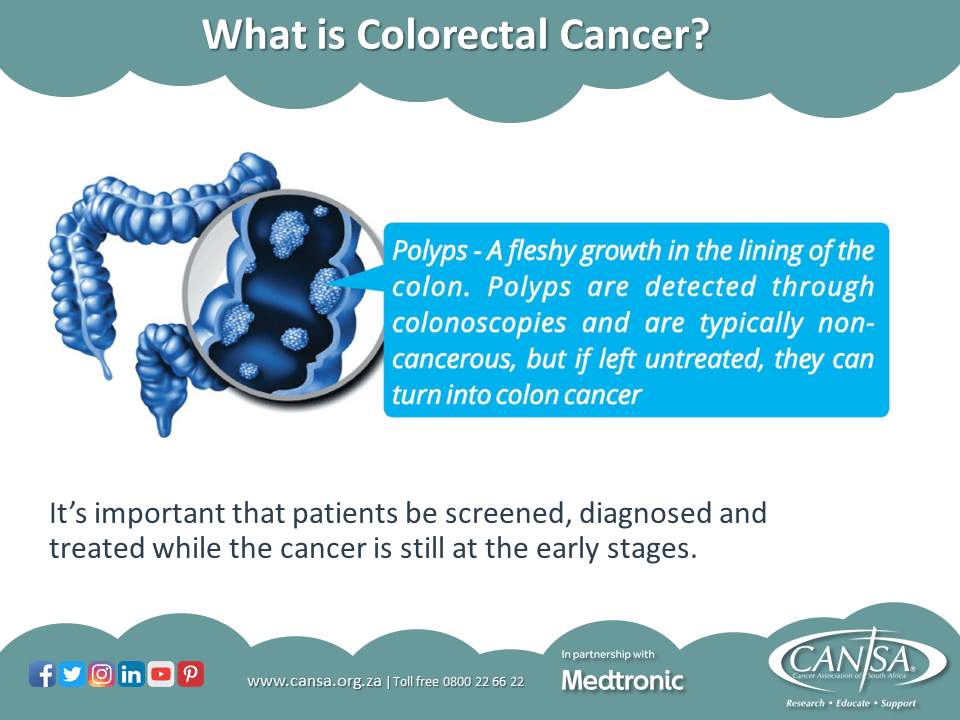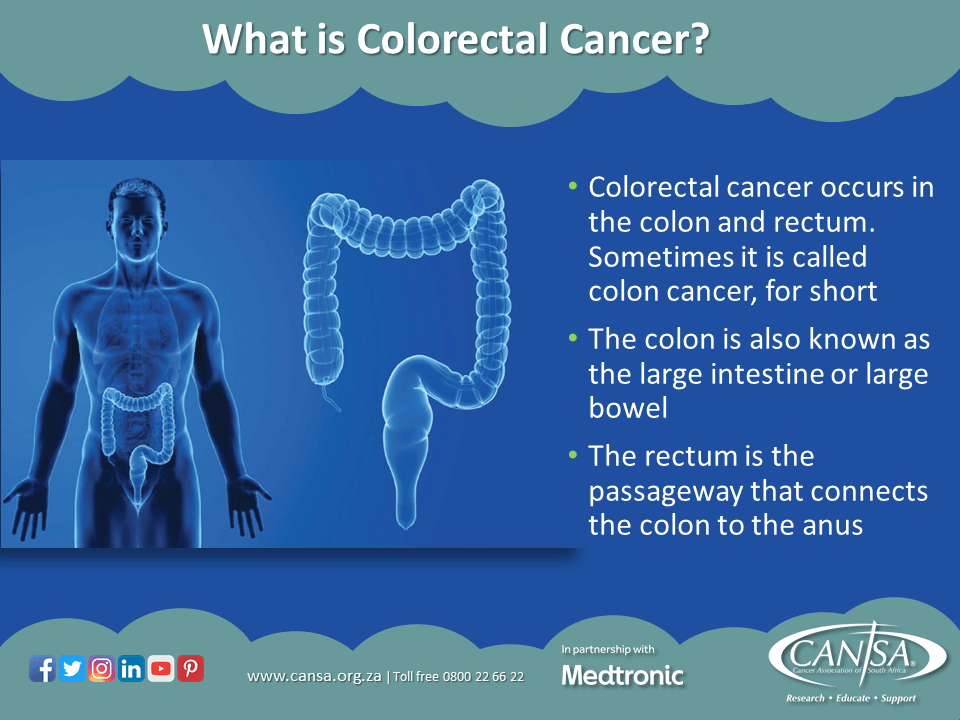CANSA and SACRS launch Colorectal Cancer Awareness & Support
April 8, 2021
The Cancer Association of South Africa (CANSA)
in partnership with The South African Colorectal Society (SACRS)
launched its Colorectal Awareness and Support Programme on World Health Day, 7 April 2021. COVID-19 has led to a delay in screenings and treatment as CANSA urges all to make health a priority.
Elize Joubert, CANSA CEO says, “Colorectal cancer affects men and women in South Africa significantly. It’s the 2nd most common cancer among men and the 3rd most common cancer among women (National Cancer Registry 2017). Unfortunately, colorectal cancer symptoms are not always recognised for what they are, leading to misdiagnosis and a more advanced stage of cancer. Our Colorectal Cancer Awareness and Support Programme will help people recognise the signs of colorectal cancer, increase knowledge around screening options to facilitate early detection and help lower the risk for colorectal cancer. We further hope to assist colorectal cancer patients to cope better with diagnosis and treatment by releasing support materials throughout the year, that aims to help them to better understand and access public and private health support services, pain management, stoma products and care.”
CANSA and the SACRS will also advocate with policy makers for a National Colorectal Cancer Policy. The policy should promote the rights of colorectal cancer patients, guide population based screening and public health services related to risk reduction, treatment, care, support and control of colorectal cancer.
Dr Adam Boutall, head of colorectal surgery at Groote Schuur Hospital and the President of the SACRS comments, “The SACRS is looking forward to partnering with CANSA as it launches its colorectal campaign. Early diagnosis of colorectal cancer, improves survival and increasing awareness and education around colorectal cancer is critical to achieving this.”
CANSA Stoma Support
Many colorectal cancer patients have a portion of their bowel and / or colon removed and end up with a permanent stoma. A stoma is an opening on the abdomen that can be connected to the digestive or urinary system to allow waste to be diverted from the body. It can take a while for a patient to adapt to living with a stoma, so it’s important to seek support from CANSA.
“CANSA’s stoma service
has an excellent offering of stoma products, accessories and provides patient support. We recently introduced our CANSA Tele Stoma Support Service where online consultations for stoma patients and their families are offered to assist with challenges or stoma queries,” Joubert states.
A stoma patient, living in a remote area, recently responded with thanks, after being assisted through the CANSA Tele Stoma Service with regards to changing the stoma bag and being given advice with regards to treatment of side effects: "You really helped me because I didn't know anything, and the consultation really helped me so much. And now I know at least how to do something and if I need help, I can ask you. Now I have a clue what to do when I have a rash."
Symptoms
It is important to contact CANSA or go to a local clinic or doctor to investigate symptoms. Symptoms of colorectal cancer might present as: a persistent change in bowel habits (including diarrhoea or constipation or a change in consistency of stools); rectal bleeding or blood in stools; persistent abdominal discomfort (cramps, gas or pain); a feeling that the bowel does not completely empty; weakness or fatigue; or unexplained weight loss.
Screening
Identifying the presence of blood in the stool, can help detect colorectal cancer early. CANSA offers faecal occult at home stool test kits (R100), which can be done at home. If the test is positive (visible red line on test strip) for the presence of blood in the stool, CANSA provides a referral letter to request a colonoscopy.
A colonoscopy in symptomatic patients or patients over the age of 50 can detect precancerous polyps in the colon. If these polyps are removed the chance of developing colorectal cancer can be dramatically reduced.
CANSA offers an online Lifestyle Risk Assessment Tool, which helps identify lifestyle factors which could increase cancer risk, and then provides recommendations on how to change behaviour to lower cancer risk. This can also be done at CANSA Care Centres.
(For more information, please contact Lucy Balona, Head: Marketing and Communication at CANSA at email lbalona@cansa.org.za. Call 011 616 7662 or mobile 082 459 5230.)















